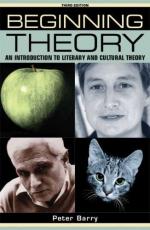
|
| Name: _________________________ | Period: ___________________ |
This quiz consists of 5 multiple choice and 5 short answer questions through Stylistics.
Multiple Choice Questions
1. According to Peter Barry, the term "new historicism" was coined by the ________ critic Stephen Greenblattt.
(a) Italian.
(b) Russian.
(c) German.
(d) American.
2. According to the narrator in the chapter titled "Feminist Criticism, the "Anglo-American" tradition appeared when?
(a) Early 1990s.
(b) Late 1970s.
(c) Early 1960s.
(d) Mid 1980s.
3. What was the name of Martin Taylor's poems that Mark Lilly used in his straight-forward essay that surveyed the range of First World War poetry?
(a) Lads: Love Poetry of the Trenches.
(b) The Prime of Miss Jean Brodie.
(c) The Doll's House.
(d) Of Human Bondage.
4. Which of the following two writers were stigmatized as exemplars of "bourgeois decadence"?
(a) Jane Austen and Stephanie Meyers.
(b) Aesop and Aeschylus.
(c) Proust and Joyce.
(d) Aristotle and Plato.
5. According to the chapter titled "Postcolonial Criticism," in its earliest phase, post-colonial criticism took as its main subject matter ________ representations of colonial countries and criticized these for their limitations and their bias.
(a) Red.
(b) Black.
(c) Gray.
(d) White.
Short Answer Questions
1. Author Peter Barry informs the reader that the feminist literary criticism of today was the direct product of the "women's movement" of the ________.
2. The gist of "Style in Language," edited by ________, is to claim that linguistics offers a more objective way of studying literature, and the book tends to set up "a confrontation of camps" between literary and language studies.
3. Peter Barry states that ________ is best understood by seeing it initially in the context of its own origins within feminism in the 1980s.
4. In the chapter titled Structuralism, Saussure used the terms ________ and ________ to signify language as a system or structure on the one hand, and any given utterance in that language on the other.
5. Peter Barry affirms that Friedrich Engels was a German ________.
|
This section contains 300 words (approx. 1 page at 300 words per page) |

|




